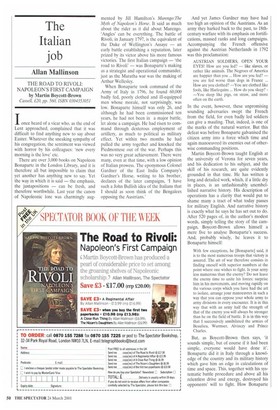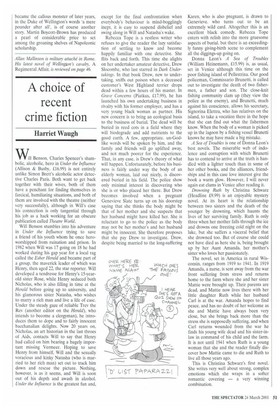The Italian job
Allan Mallinson
THE ROAD TO RIVOLI: NAPOLEON'S FIRST CAMPAIGN by Martin Boycott-Brown Cassell, £20, pp. 560, ISBN 0304353051 Ionce heard of a vicar who, as the end of Lent approached, complained that it was difficult to find anything new to say about Easter. Whatever the sneaking sympathy of his congregation, the sentiment was viewed with horror by his colleagues: 'new every morning is the love' etc.
There are over 3,000 books on Napoleon Bonaparte in the London Library, and it is therefore all but impossible to claim that yet another has anything new to say. Yet the way in which it is said — the emphasis, the juxtapositions — can be fresh, and therefore worthwhile. Last year the canon of Napoleonic lore was charmingly aug
mented by Jill Hamilton's Marengo:The Myth of Napoleon's Horse. It said as much about the rider as it did about Marengo. 'Angles' can be everything. The battle of Rivoli, in January 1797, is the equivalent of the Duke of Wellington's Assaye — an early battle establishing a reputation, later prized by its victor above his more famous victories. The first Italian campaign — 'the road to Rivoli' — was Bonaparte's making as a strategist and operational commander, just as the Maratha war was the making of Arthur Wellesley.
When Bonaparte took command of the Army of Italy in 1796, he found 60,000 badly fed, poorly clothed and ill-equipped men whose morale, not surprisingly, was low. Bonaparte himself was only 26, and although he had been commissioned ten years, he had not been in a major battle, let alone a campaign. He had risen to command through dexterous employment of artillery, as much to political as military effect. Yet within two months he had pulled the army together and knocked the Piedmontese out of the war. Perhaps this was no very great achievement. There were many, even at that time, with a low opinion of Italian prowess. The eponymous Colonel Gardner of the East India Company's Gardner's Horse, writing to his brother, declares of the later campaigns, 'I have such a John Bullish idea of the Italians that I should as soon think of the Bengalees opposing the Austrians.' And yet James Gardner may have had too high an opinion of the Austrians. As an army they harked back to the past, to 18thcentury warfare with its emphasis on fortifications, massed ranks and long campaigns. Accompanying the French offensive against the Austrian Netherlands in 1792 was this proclamation:
AUSTRIAN SOLDIERS, OPEN YOUR EYES! How are you led? — like slaves, or rather like animals. The Negroes of America are happier than you ... How are you fed? — you are fed worse than dogs in France ... How are you clothed? —You are clothed like fools, like Harlequins How do you sleep? —You sleep like pigs, on straw, and more often on the earth.
In the event, however, these unpromising sounding adversaries swept the French from the field, for even badly led soldiers can give a mauling. That, indeed, is one of the marks of the natural warrior. But this defeat was before Bonaparte galvanised the citizen army into a force which time and again manoeuvred its enemies out of otherwise commanding positions.
Martin Boycott-Brown taught English at the university of Verona for seven years, and his dedication to his subject, and the skill of his research, are quite evidently grounded in that time. He has written a long and detailed work, which, if a little dry in places, is an unfashionably unembellished narrative history. His description of operations has a clarity that would put to shame many a tract of what today passes for military English. And narrative history is exactly what he says he has set out to do. After 520 pages of, in the author's modest words, simply telling the story of the campaign, Boycott-Brown allows himself a mere five to analyse Bonaparte's success. And, probably wisely, he leaves it to Bonaparte himself:
With few exceptions, he 'Bonaparte] said, it is to the most numerous troops that victory is assured. The art of war therefore consists in finding oneself with superior numbers at the point where one wishes to fight. Is your army less numerous than the enemy? Do not leave the enemy time to unite his forces: surprise him in his movements, and moving rapidly on the various corps which you have had the art to isolate, arrange your manoeuvres in such a way that you can oppose your whole army to army divisions in every encounter. It is in this way that with an army half the strength of that of the enemy you will always be stronger than he on the field of battle. It is in this way that I successively annihilated the armies of Beaulieu, Wurmser, Alvinczy and Prince Charles.
But, as Boycott-Brown then says, 'it sounds simple, but of course if it had been simple, everyone would have done it'. Bonaparte did it in Italy through a knowledge of the country and its military history which gave him an edge in calculations of time and space. This, together with his systematic battle procedure and above all his relentless drive and energy, destroyed his opponents' will to fight. How Bonaparte became the callous monster of later years, in the Duke of Wellington's words 'a mere pounder after all', is of course another story. Martin Boycott-Brown has produced a pearl of considerable price to set among the groaning shelves of Napoleonic scholarship.
Allan Mallinson is military attaché in Rome. His latest novel of Wellington's cavalry, A Regimental Affair, is reviewed on page 46.















































































 Previous page
Previous page